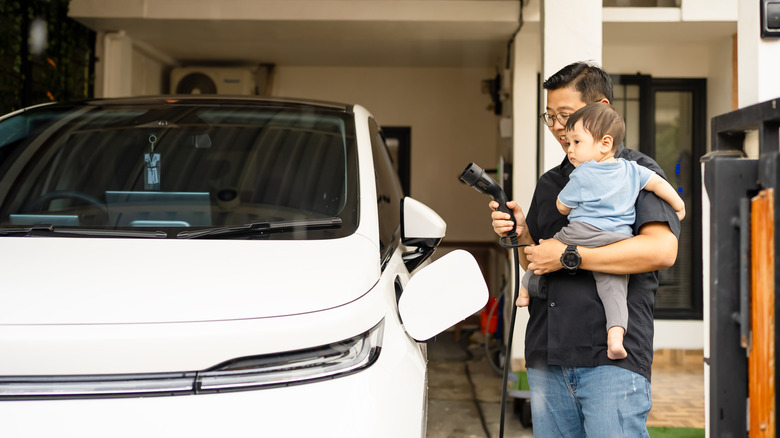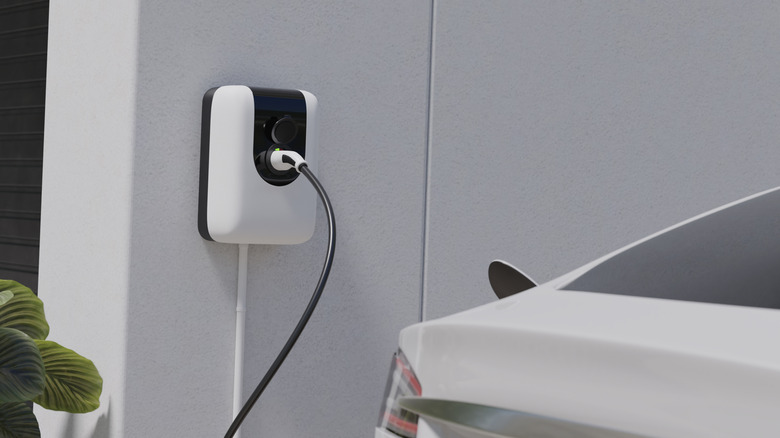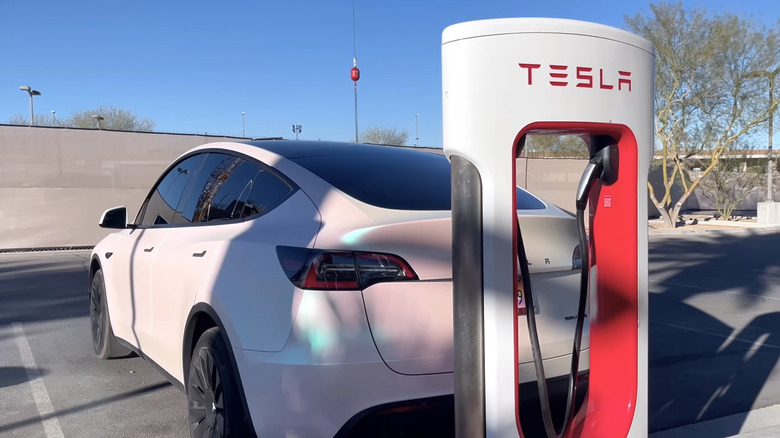Will A Tesla Charging Station Increase Your Electric Bill? The Answer Might Surprise You
If you're interested in reducing your carbon footprint, you may be thinking about making the switch from a gas-powered automobile to an electric vehicle (EV). EVs do not generate tailpipe emissions and use energy more efficiently than automobiles with internal combustion engines (ICE). When it comes to EVs, Tesla is the most popular brand in the United States, with its two most popular models easily outselling all other competitors. However, while buying an EV may be good for the environment, does an electric car really save you money in the long run – specially considering you have to set up and use an EV home charger? Not surprisingly, charging your EV at home will increase your electric bill. However, what might surprise you is that the increase in your bill won't be as much as you might expect.
According to The Electricians, average EV owners should expect to see only a $30 to $60 monthly increase in electricity costs when charging their EV at home. Tesla's at-home charging stations, in particular, utilize specific technology that can help you save even more money on charging, such as allowing you to control the time when the at-home charger is on in order to take advantage of potentially lower electric prices during certain hours. Best of all, even if you don't own a Tesla vehicle — or are one of the many customers who sold off their Tesla vehicles in 2025 – you can still use a Tesla charger to power other car brands and models of EVs.
Comparing at-home charging costs to gas prices
Rather than spending roughly $45 to $60 each time you fill your gas tank, the cost to operate an EV instead appears on your monthly electric bill. When people install an electric car charger at home, they might have an expectation about how much their electric bills will increase. If you've been driving a vehicle that runs on gasoline, you might even expect that your electric bill will increase a comparable amount to what you'd pay for gas each month. However, a 2020 study from Consumer Reports found that EV owners saved about 60% on EV charging compared to what they would have spent on gas.
The actual amount you will save will ultimately depend on fluctuations in both the price of gas and electricity in your geographic area. One Redditor in the subreddit r/TeslaLounge, estimated an electric bill increase of about $125 per month, which is significantly less than the user estimated spending on gas. Meanwhile, Redditor u/ewa_101 had an electric bill increase of about $100 per month and shared, "I'm grateful! $100 is about 35% of what I was spending before I went electric." Plus, if you install a Tesla charging station at home, the device also tracks statistics that can help you estimate how much you're spending. With that said, your electric bill won't track your EV charging separately. The charging station tracks the charging history for your EV by month and year, listing the amount you've used and the estimated cost in your area.
At-home charging costs are cheaper than public stations
Another option to consider when deciding on how best to charge your EV are public Tesla charging station costs. While you might expect the cost of using a public station to be similar to what it would cost to power up your EV at home, the reality is a bit different. According to Solar Reviews, you can expect to pay anywhere from $6 to $50 to fully charge at a public station– meaning that charging at home can be significantly cheaper.
Rates vary by location and even by the speed at which you want to go. A public Level 2 station usually costs 20 to 25 cents per kWh, whereas if you use a Level 3 fast station, you might pay 40 to 60 cents per kWh. For comparison, you'll typically only pay between 13 and 35 cents per kWh when charging at home, depending on which state you live in, according to EnergySage.


